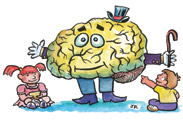Don't forget Brain Awareness Week
Don't forget Brain Awareness Week McGill University
User Tools (skip):
Don't forget Brain Awareness Week
WARM-SPARK Writers
Most of us forget things some of the time: the name of an acquaintance or where we put our house keys. Or, for that matter, where we put our house keys. It's a fine line as to when normal absent-mindedness becomes a clinical memory problem. Neuroscience researchers Dr. Gabriel Leonard and Dr. Howard Chertkow will explore this and related issues at this year's Eighth Annual Brain Awareness Week in Montreal, which runs from March 14 to March 20.

Jack Ruttan
The aim of Brain Awareness Week is to inform the general public about the workings of the brain. Each year, graduate students visit over 150 local elementary and high schools to talk about the field of neuroscience. Additionally, prominent Montreal researchers host public lectures on topics ranging from the effects of drugs, sex and even music on the brain, to neurodegenerative diseases and memory loss.
"As early as age 40, some people start noticing that they have more trouble remembering names and where they parked their cars compared to when they were 20," says Chertkow. While memory decline is part of the normal aging process, a small number of people suffer more pronounced memory loss. The term used to classify this condition is Mild Cognitive Impairment (MCI).
Chertkow considers that a person could be diagnosed with MCI if they complain of memory loss and if a doctor observes a below average performance on memory tests. However, other cognitive domains such as decision-making and attention remain unaffected. People with MCI are completely functional in all aspects of their daily life — they are just more forgetful than their peers. What is troubling is that most, but not all, people with MCI develop Alzheimer's disease within 10 years. The greatest difficulty for a person diagnosed with MCI is coping with the fear of what their future holds.
Not all aspects of memory are affected in MCI, because different components of memory are regulated by different neurotransmitters. Specifically, long-term memory and immediate memory remain intact. The ability to learn new information or recall recent events — memory processes that rely on the hippocampus and the medial temporal lobes of the brain — are disrupted in MCI, and even more dramatically in early Alzheimer's disease.
How does one differentiate normal declines in memory or even MCI from the more serious memory loss associated with Alzheimer's? "Forgetting to pick up a loaf of bread or carton of milk on your way home from work is normal. Consistently doing unusual things like putting the shoe polish in the fridge, that's more serious," explains Dr. Leonard.
The hallmarks of Alzheimer's disease include the inability to retain and recall autobiographical details, such as the marriage of a child or the death of a relative. Another is the inability to remember a source of information. One of the first indicators that Ronald Reagan was experiencing cognitive changes came as early as the 1980 presidential campaign, when he told the story of a heroic pilot whose plane had gone down in flames, reciting it as though it was a true story when in fact it had been a part of a movie he had seen.
There is currently no cure for either MCI or Alzheimer's. It is extremely difficult and expensive to do proper studies on potential treatments for these diseases. Hundreds of subjects must be followed for a period of at least three years to determine if a treatment is effective. Chertkow believes that in 50 years, our current diagnosis and treatment for Alzheimer's and MCI will seem primitive. "We will have either a blood test or a brain-imaging test that irrevocably says this person has Alzheimer's. And maybe you'll be able to do the test 20 or more years earlier, even before memory complaints," says Chertkow.
While there is currently no evidence to prescribe medications to MCI patients, there are some things associated with lower rates of Alzheimer's that have no down side. Patients can lose weight, exercise and increase their mental stimulation. For those of us hoping to keep our memories intact for as long as possible, Dr. Leonard encourages us to remain socially and mentally active. What better reason do you need to attend the Brain Awareness Week public lecture series and keep those cerebral juices flowing?
To hear more about the mysteries of memory, attend the Brain Awareness Week public lectures from March 14 to 17. All lectures are free and open to the general public. Talks start at 7:30 pm. Coffee and refreshments will be provided. No reservations are necessary. See www.sfn-montreal.ca/baw/ for locations and topics.
WARM-SPARK (Writing About Research at McGill-Students Promoting Awareness of Research Knowledge) is a program sponsored by the Faculty of Science, the Offices of the Vice-Principal (Research) and University Relations, NSERC, the Faculty of Engineering and the Faculty of Agriculture and Environmental Sciences. See www.spark.mcgill.ca for more information and articles.
